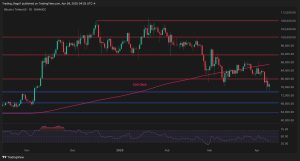Crypto and blockchain are set to become the catalyst for a long-awaited transformation of the “antiquated and exclusionary” payments industry, according to a survey conducted by Ripple and the U.S. Faster Payments Council.
The survey found that 100% of respondents believe crypto and blockchain can result in benefits like efficiency and cost saving for the payments industry.
“[Crytptocurrencies] are well-positioned to solve some seemingly intractable issues in payments by filling various gaps in payments flows efficiently and effectively.”
However, there is a dire need for regulatory clarity before the evolution can commence. Almost 90% of the respondents said that further growth in crypto payments adoption hinges on regulators providing the industry with clear rules around how to operate.
The majority of respondents said that the uncertain regulatory environment is the sole barrier to the adoption of crypto payments currently — with only 10% believing that there are no benefits in crypto payments.
Primary benefits of crypto in payments
Cryptocurrencies and blockchain are expected to save the payments industry roughly $10 billion in costs by 2030, the report said.
The vast majority of the survey respondents — 97% — believe that crypto and blockchain will have a “significant role in enabling faster payments within the next three years.”
The primary benefit of cryptocurrencies and blockchain technology is that they can drastically lower transaction costs and time, leading to savings for both businesses and consumers.
The report said that currently, the payments industry is wrought with pre-funding, high transaction fees, slow settlement times, and opaque capital flows — all of which supplement the ever-rising cost of sending and receiving money.
As of 2022-end, the average cost of a cross-border remittance is 6% of the transferred amount and 2x more than the goal set by the U.N. Meanwhile, the average cost of a crypto transaction of the same scale as a remittance is fractions of a percent.
Crypto payments integration
More than 50% of the survey respondents believe that most merchants will integrate crypto payments and start accepting a wide variety of cryptocurrencies for their services within the next one to three years.
Similarly, more than 50% are considering integrating crypto payments into their own businesses in the future. However, only 17% have already done so.
The report said that the slow adoption rate primarily stems from regulatory ambiguity and even the second most cited barrier for adoption — limited industry acceptance — is more or less a side-effect of not having clear rules established for the industry.
The Ripple report cited a 2022 Deloitte survey, which points to similar findings, with 87% of merchants saying that crypto payments offer a “competitive edge.”
In terms of regions, the Middle East and Africa are the “most bullish” on crypto payments. Roughly one-third of respondents from the region expect to integrate crypto payments within the next 12 months.
The report said the bullish sentiment toward crypto payments in the region stems from a “growing appetite for broader financial access and inclusion.”
The post Ripple survey reveals overwhelming support for crypto payments – regulatory uncertainty sole barrier appeared first on CryptoSlate.




















